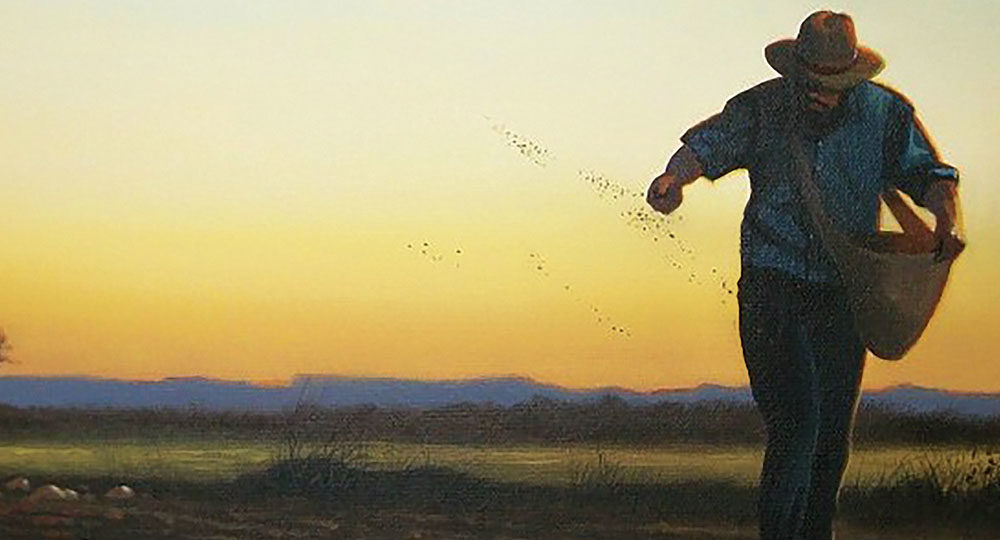You Reap What You Sow Obadiah 15—16
Have you ever seen someone revel in another’s misfortune or be smug and self-satisfied when sympathy was called for?
There’s a saying, “What goes around comes around.” The Bible puts it this way: “Whatever a man sows, that he will also reap” (Gal. 6:7); and often we reap far more than we sow.
The Edomites exemplified this truth. When they should have shown sympathy, they gloated. Then they made matters worse by “piling on.” Ultimately, they precipitated their own extermination.
The victims were the Israelites, the descendants of Jacob. The perpetrators were the Edomites, the descendants of Esau, Jacob’s brother.
Though Israel deserved God’s judgment for transgressing the Mosaic Covenant, God was angry with the Edomites for their attitude and treatment of their distant cousins. Speaking through the prophet Obadiah, He warned the Edomites their allies would betray them and their dwellings would be wiped cleaner than a vineyard after harvest or a house after a burglary.
“As you have done,” God promised them, “it shall be done to you” (Obad. 15).
Why did God destroy them?
First, the Edomites gloated over their brothers’ misfortune. They arrogantly rejoiced that invaders had humiliated Israel.
In fairness, Israel had not been the best neighbor. King Saul had fought the Edomites. King David had conquered them and “also put garrisons in Edom;…and all the Edomites became David’s servants” (2 Sam. 8:14).
Though Edom regained its freedom, it was later conquered by King Amaziah, who “killed ten thousand Edomites in the Valley of Salt, and took Sela by war, and called its name Joktheel” (2 Ki. 14:7). Struggle and animosity between the two nations were nearly constant throughout the days of the Jewish kings.
Yet to God, these circumstances did not justify Edom’s attitude. He detested Edom’s haughtiness and its celebration over Israel’s judgment.
Obadiah’s message is that gloaters never win: “Do not rejoice when your enemy falls, and do not let your heart be glad when he stumbles; lest the Lᴏʀᴅ see it, and it displease Him, and He turn away His wrath from him” (Prov. 24:17–18; cf. Obad. 15).
In Psalm 35 David asked God to judge those who rejoice at his stumbling. Job said, “If I have rejoiced at the destruction of him who hated me, or lifted myself up when evil found him (Indeed I have not allowed my mouth to sin by asking for a curse on his soul)” (Job 31:29–30).
Jesus takes the Old Testament teaching to an even higher level:
But I say to you who hear: Love your enemies, do good to those who hate you, bless those who curse you, and pray for those who spitefully use you. To him who strikes you on the one cheek, offer the other also. And from him who takes away your cloak, do not withhold your tunic either. But love your enemies, do good, and lend, hoping for nothing in return; and your reward will be great, and you will be sons of the Most High. For He is kind to the unthankful and evil (Lk. 6:27–29, 35).
Second, the Edomites took advantage of the helpless. God judged Edom for its arrogant, unsympathetic treatment of the defeated Israelites.
The Edomites “stood at the crossroads to cut off those among them who escaped;…[and they] delivered up [imprisoned] those among them who remained in the day of distress” (Obad. 14). Apparently they killed and enslaved those who had been able to flee. Later they entered the fallen Israelite cities and looted them.
Not content merely to gloat, the Edomites went a step further: They pillaged the helpless. Rather than aiding and comforting the surviving Israelites, they killed or imprisoned them and stole everything of value they could find. So God promised to wipe Edom from the face of the earth:
For the day of the Lᴏʀᴅ upon all the nations is near; as you have done, it shall be done to you; your reprisal shall return upon your own head. For as you drank on My holy mountain, so shall all the nations drink continually; Yes, they shall drink, and swallow, and they shall be as though they had never been (vv. 15–16).
This is the law of sowing and reaping. You reap what you sow. The apostle Paul stated the principle most fully in Galatians 6:7–10:
Do not be deceived, God is not mocked; for whatever a man sows, that he will also reap. For he who sows to his flesh will of the flesh reap corruption, but he who sows to the Spirit will of the Spirit reap everlasting life. And let us not grow weary while doing good, for in due season we shall reap if we do not lose heart. Therefore, as we have opportunity, let us do good to all, especially to those who are of the household of faith.
Well-known preacher Charles Stanley stated the elements of this law well:
Every choice has a consequence. If we make wise, godly decisions, we can expect God to reward us for our faithfulness. If we make rash or sinful choices, we can anticipate negative consequences (Gal. 6:7–8). In other words, you reap what you sow, more than you sow, and later than you sow….Although the principle uses agricultural terms, it applies to spiritual things and—by virtue of that fact—all of life.1
The Edomites sowed animosity, murder, imprisonment, theft, and destruction. So they were destined to reap the same or worse.
What are you sowing? Are you spiteful to those who have harmed you? Or do you assist them in their need? Are you sowing to the flesh or to the Spirit? Bible expositor John Stott commented,
To ‘sow to the flesh’ is to pander to it, to cosset, cuddle and stroke it, instead of crucifying it….Every time we allow our mind to harbour a grudge, nurse a grievance, entertain an impure fantasy, or wallow in self-pity, we are sowing to the flesh. Every time we linger in bad company whose insidious influence we know we cannot resist, every time we lie in bed when we ought to be up and praying, every time we read pornographic literature, every time we take a risk which strains our self-control, we are sowing, sowing, sowing to the flesh. Some Christians sow to the flesh every day and wonder why they do not reap holiness.2
On the positive side, Stott wrote,
It is those who ‘sow to the Spirit’ (Gal. 6:8) who reap the fruit of the Spirit. And to ‘sow to the Spirit’ means to cultivate the things of the Spirit, for example, by our wise use of the Lord’s Day, the discipline of our daily prayer and Bible reading, our regular worship and attendance at the Lord’s Supper, our Christian friendships and our involvement in Christian service. An inflexible principle of all God’s dealings, both in the material and in the moral realm, is that we reap what we sow. The rule is invariable. It cannot be changed, for ‘God cannot be mocked’ (Gal. 6:7). We must not therefore be surprised if we do not reap the fruit of the Spirit when all the time we are sowing to the flesh. Did we think we could cheat or fool God?3
On sowing to the Spirit, the great 19th-century British preacher, Charles Haddon Spurgeon, wrote,
Sowing looks like a losing business, for we put good corn into the ground never to see it anymore. Sowing to the Spirit seems a very fanciful, dreamy business; for we deny ourselves and apparently get nothing for it. Yet if we sow to the Spirit by studying to live unto God, seeking to obey the will of God, and laying ourselves out to promote His honor, we shall not sow in vain. Life shall be our reward, even everlasting life. This we enjoy here as we enter into the knowledge of God, communion with God, and enjoyment of God. This life flows on like an ever-deepening, ever-widening river till it bears us to the ocean of infinite felicity, where the life of God is ours forever and ever.
Let us not this day sow to our flesh, for the harvest will be corruption, since flesh always tends that way; but with holy self-conquest let us live for the highest, purest, and most spiritual ends, seeking to honor our most holy LORD by obeying His most gracious Spirit. What a harvest will that be when we reap life everlasting! What sheaves of endless bliss will be reaped! What a festival will that harvest be! LORD, make us such reapers, for thy Son’s sake.4
When we encounter the misfortune of others, better to say, “There but for the grace of God go I.” Better yet, do unto others what you’d want them to do to you. Such sowing reaps everlasting reward.
ENDNOTES
- Dr. Charles Stanley, “The Principle of Sowing and Reaping,” In Touch Ministries <tinyurl.com/StanleySR1>.
- John R. W. Stott, The Message of Galatians (Leicester, England: Inter-Varsity, 1968), 170.
- John Stott, Authentic Christianity, cited in “John Stott on the Spirit-Filled Christian for Pentecost,” TitusONENine, weblog of the Rev. Canon Dr. Kendall Harmon <tinyurl.com/Stottt>.
- Charles Haddon Spurgeon, cited in “Faith’s Checkbook,” Christianity.com, May 2, 2014 <tinyurl.com/spdevo>.









Your message is timely for those of us who are of Tigray origin. Our brothers and sisters in Tigray are being killed because of their ethnicity, being raped and deliberately infected with HIV, looted, displaced, deprived of basic services, and humanitarian aid. In order to make recovery difficult, the Ethiopian and Eritrean governments are looting everything from household items to big factories and trucks. Universities, churches, food, animals, even pots, and pan are not excluded from the theft. Today, as I am reading Ethiopia is being attacked by Sudan and Ethiopians asking why their country is being attacked, I cannot help but think what goes around comes around. I am deeply concerned true Christianity is lost on Ethiopians who claim Ethiopia to be the land of ancient Christianity. Anyways, thank you for this wonderful message. It has given me hope and lifted me from my two months of depression and sadness. I am asking all Christians to pray for Tigray as it is in grave danger.
Thank you man of God, what you have said is nothing but the truth, these is not uncommon wisdom is from Above, why am saying is that it is not all the ministers of the Gospel that knows this,
May God be your strength.